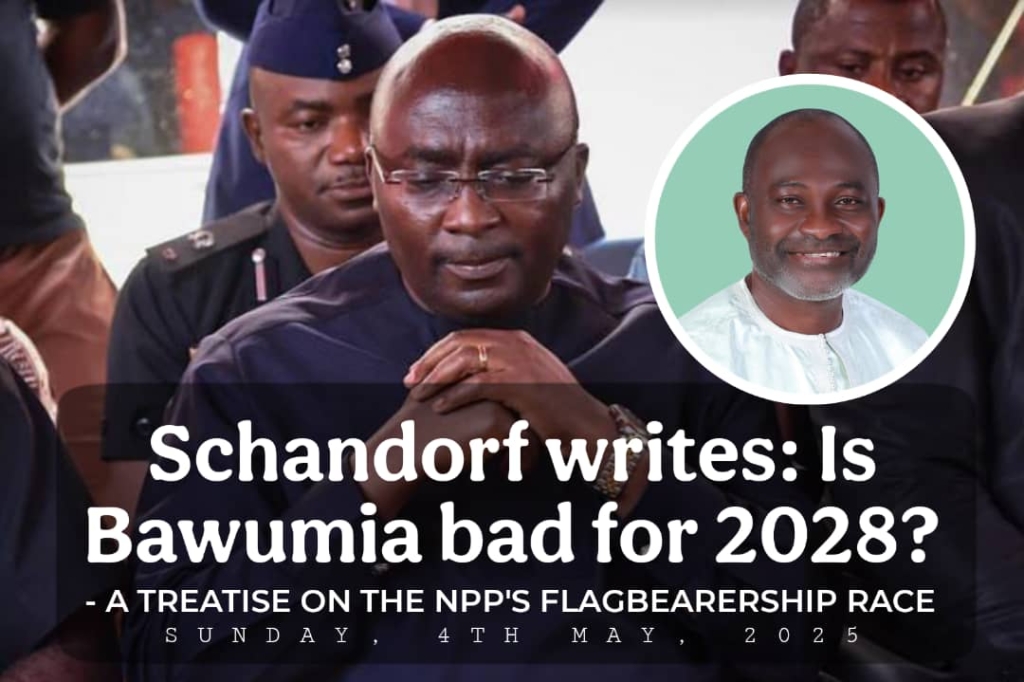
Today is 4th May 2025 — and from now until the next general election, there remain approximately 1,313 days. Indeed, the interval is strikingly vast, and, under ordinary circumstances, no one ought to be preoccupied with the 2028 polls.
However, as the political sages often say, elections are not an event but a process. This explains why Ghana’s two major political parties are already girding their loins in preparation for the next battle at the ballot box.
In the case of the National Democratic Congress (NDC), two familiar faces have emerged as possible contenders for the party’s flagbearership. The first is the party’s National Chairman, Johnson Asiedu Nketia; the second, the current Chief of Staff, Mr Julius Debrah.
Between the two, one is believed to be the favourite of the power brokers, while the other commands the admiration of the grassroots — a compelling scenario that promises intrigue, drama, and political suspense.
Though neither has formally declared their intentions, only a fool would disregard the threat of rain while dark clouds gather — and still leave his laundry on the line.
Turning our gaze to the New Patriotic Party (NPP), the outlook appears clearer. Unlike the NDC’s murky picture, the NPP’s internal dynamics suggest that Kennedy Agyapong is poised to give Dr Mahamudu Bawumia a fierce contest for the 2028 flagbearership.
And thus we arrive at the central thesis of this piece: is Bawumia truly a flawed candidate who must be discarded?
To answer this, we must first examine the principal determinant of electoral victory in a country like Ghana, where ‘bread-and-butter’ issues dominate political consciousness.
It is my considered view that the single most decisive factor influencing electoral outcomes is the state of the economy — and, more specifically, how the average voter feels in their pocket.
This point is so essential that, regardless of the splendour of any campaign — with its catchy anthems, soaring speeches, and exuberant rallies — once citizens are hungry and the cost of living remains punishing, no amount of political theatre will compel them to endorse those they blame for their suffering.
Indeed, the Akufo-Addo administration came to be seen as the chief architect of the people’s hardship — and, in my view, this perception was the principal reason why the electorate dealt the NPP a stinging blow in 2024.
So much so that even if Barack Obama had led the party, he might still have succumbed to the sword of voter rage.
In plain terms, the Akufo-Addo administration’s legacy was so burdensome it would have crushed the political hopes of any candidate daring enough to bear the NPP’s standard in that election.
To many political analysts, the 2024 elections were less a referendum on Dr Bawumia’s capabilities and more a judgment on President Akufo-Addo’s stewardship.
In truth, Ghana’s constitutional structure renders the Vice-President largely advisory in function. So while Dr Bawumia was indeed the face of the Economic Management Team, his powers to implement policy were limited. In that sense, however complicit he may appear, he was not the principal actor in the drama of economic decline — a point I have long maintained.
For clarity, this is not to absolve Dr Bawumia of all blame. He made several strategic missteps which further complicated his political calculus.
Yet the more salient question is: had Kennedy Agyapong or any other contender led the party into 2024, what new message could they have convincingly offered, given the weight of their own imperfections?
To the voting public, the Akufo-Addo government came to symbolise arrogance, economic incompetence, and a litany of governance failures — all of which even the NPP itself now openly acknowledges. In such an environment, no candidate, no matter how charismatic or beloved, could have restored the party’s fortunes.
Indeed, the 2024 defeat was a blow destined to land. It was a political bullet meant to pierce — and a knife designed to cut — so much so that even the finest of political craftsmen might not have survived the fury of the electorate.
The essence of the matter is this: while Dr Bawumia made his own errors and bore his own scars, the 2024 election was unwinnable for the NPP — and thus, it is neither fair nor logical to single him out as the reason for the party’s electoral collapse or to suggest he must be replaced ahead of 2028.
In fact, if Dr Bawumia is cast aside, it could dangerously reinforce the narrative that the NPP is an Akan-centric party, and undo the strategic gains he has made for the party in the North. The political cost of such a move could be immense and enduring — hence, the idea of his replacement should not be treated as a default.
Therefore, I am persuaded to conclude that the NPP’s electoral prospects in 2028 will depend less on Bawumia’s candidature and more on the failings — or otherwise — of the NDC.
Should the NDC stumble, the NPP will only benefit if it positions itself as a credible opposition — one grounded in truth, offering compelling policy alternatives, and demonstrating internal discipline and cohesion.
Ultimately, replacing a drummer does not guarantee better rhythm — especially if the drum itself is broken. Selah!
About the Author:
Paa Kwesi Schandorf is a writer, journalist, and corporate MC, twice nominated by the BBC for the Komla Dumor Award. He currently serves as Acting News Editor at TV Africa, having previously worked with JoyNews.
DISCLAIMER: The Views, Comments, Opinions, Contributions and Statements made by Readers and Contributors on this platform do not necessarily represent the views or policy of Multimedia Group Limited.
DISCLAIMER: The Views, Comments, Opinions, Contributions and Statements made by Readers and Contributors on this platform do not necessarily represent the views or policy of Multimedia Group Limited.



